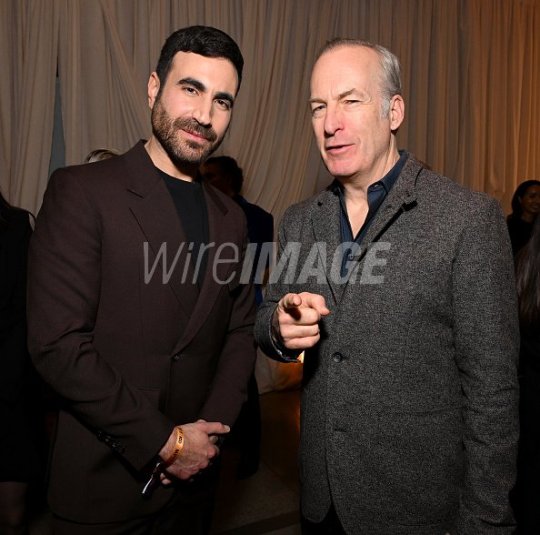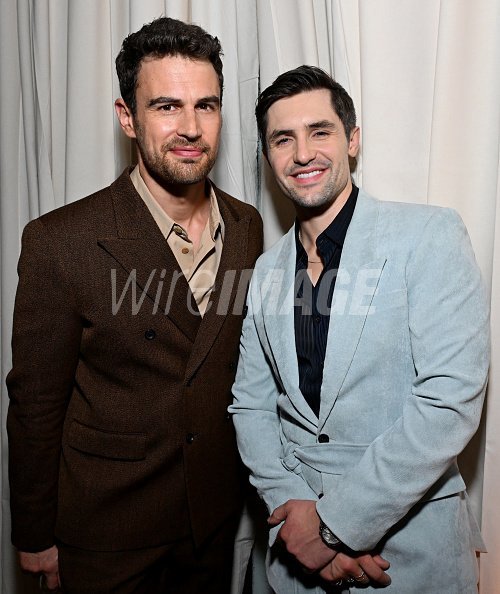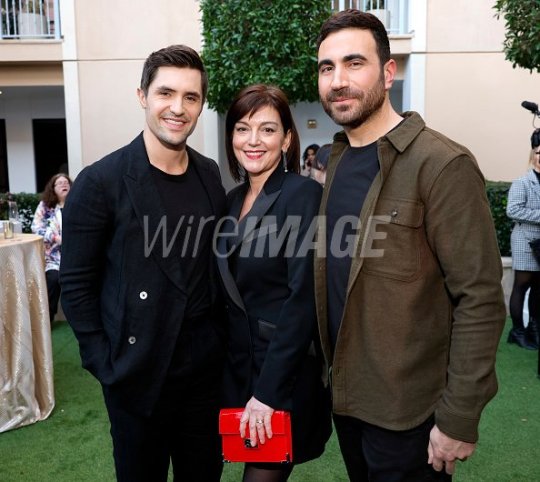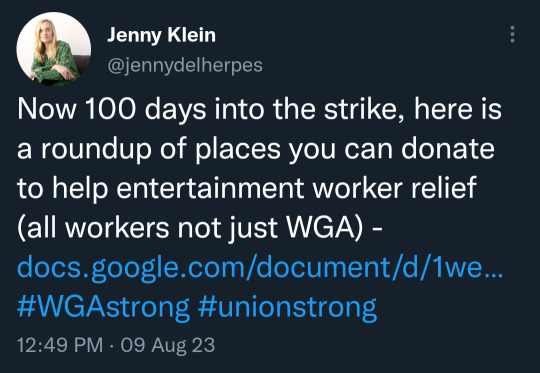#Motion Picture and Television Fund
Text
Walking the WGA and SAG/AFTRA Picket Line at Paramount Studios
On July 20, 2023, I did something I had been meaning to do for a long time: walk the picket line alongside members of the Writer’s Guild of America (WGA) and the Screen Actors Guild – American Federation of Television and Radio Artists (SAG/AFTRA). Both unions are in a furious labor dispute with the Alliance of Motion Picture and Television Producers (AMPTP) as streaming has forever changed the…

View On WordPress
#Actors Strike#AFTRA#American Federation of Television and Radio Artists#Entertainment Community Fund#Hollywood#Los Angeles#Melrose Avenue#Motion Picture and Television Fund#MPTF#Paramount Studios#Picket#Picket Line#Protest#SAG#Screen Actors Guild#Strike#Video#WGA#WGA Contract 2023#WGA on Strike#Writers Guild of America#Writers Strike
2 notes
·
View notes
Text

Power couple 🔥🔥🔥
13 notes
·
View notes
Text

14 notes
·
View notes
Note
what’s today event???
mptf’s evening before party for the primetime emmy awards. they were all at the pre emmy's party. nobody has really posted photos yet even though a ton of celebs attended but hopefully we'll see some soon
#asks#anonymous#📩#just realized i literally typed the abbreviation wrong 😭#fixed it#anyways mpft = motion picture and television fund#mptf** FUCK! 😭
4 notes
·
View notes
Text
There's an auction to support the Motion Picture and Television Fund for healthcare for those striking in Hollywood and there's the usual Zooms and dinners with actors, but some of the biddable items are absolutely unreal in the best way



38K notes
·
View notes
Text
[September 1] Don’t Fall For Hollywood Bosses’ New PR Spin
'Today marks the 122nd day of the Writers Guild of America (WGA) strike and 48th day of the Screen Actors Guild and American Federation of Television and Radio Artists (SAG-AFTRA) strike. The dual work stoppages have brought Hollywood to a standstill, with production halted on films and television programs, and premieres and other promotional events either scaled back or canceled. Both guilds are striking over demands that are more than reasonable, particularly given studio executives’ record pay. These demands include fair compensation for streaming media (particularly better residuals, which currently pale in comparison to what they are for network and cable broadcasts), robust studio support for health and retirement funds, and safeguards around the use of artificial intelligence. (For more on why WGA and SAG-AFTRA are on strike, read the excellent reporting of Jacobin’s Alex Press).
In a move that has shocked…pretty much no one, Hollywood bosses don’t want to share their earnings with the very storytellers responsible for generating them. At the same time, they’re happy to make workers pay the cost for their own miscalculations about streaming.
The major Tinseltown studios – organized under the Alliance of Motion Picture and Television Producers (AMPTP) trade association – remain stubbornly opposed to striking a fair deal with either guild. Under the leadership of AMPTP president Carol Lombardini, studios have employed brutal tactics to bust the strike, including threatening to drag things out until writers lose their homes and using management-friendly trade publications to pressure the guilds into accepting lowball offers. These tactics have backfired spectacularly: not only have they failed to end either strike, but they’ve also turned the public overwhelmingly against the AMPTP. A new Gallup poll finds that Americans back the WGA over the AMPTP by 72% to 19%, and SAG-AFTRA over AMPTP by 64% to 24%.
Aware of their reputational damage (but willfully ignorant of the anti-worker attitude that caused it), the AMPTP announced a “reset” to its approach this week – not by negotiating in good faith or meeting the guilds’ demands, but by hiring a pricey crisis-management PR firm to revamp its image! According to Deadline, the AMPTP has hired The Levinson Group – a D.C.-based PR shop best known for representing the U.S. Women’s National Soccer Team in its campaign for pay equity – to “reframe the big picture for studio and streamer CEOs who have been characterized as greedy, imperious and out of touch.”
If you’re feeling like you’ve seen this movie before, you’re not wrong. During the last WGA strike 15 years ago, studio bosses hired former Clinton comms strategists Mark Fabiani and Chris Lehane to revive the AMPTP’s flagging public image. The revolving-door duo were paid a jaw-dropping $100,000 per month by the AMPTP to strike-bust, deploying campaign-style spin attacks designed to break the WGA’s resolve.
As I wrote for The American Prospect in May:
“Fabiani and Lehane created a website with a live tally of the millions of dollars in income that guild members and on-set crew had purportedly lost by striking. They urged studio CEOs to publicly refer to WGA representatives as “organizers” rather than “negotiators” because the former “sound[ed] more Commie.” Lehane even told the press at one point that striking writers were “making more than doctors and pilots,” cynically arguing that the strike was harming “real working-class people” like below-the-line workers who had lost income from struck late-night talk shows […] Fabiani and Lehane were [also] the brains behind a “strongly worded and downright menacing” AMPTP press release breaking off negotiations with the WGA in December 2007. This move allowed the studios, which cited a protracted strike as an “unforeseeable event,” to invoke force majeure contract clauses and cancel multiple writer-producer deals worth tens of millions of dollars, severely demoralizing the WGA’s rank-and-file members.”
The parallels between 2008 and today are striking. Like Fabiani and Lehane (who have worked for scandal-plagued clients like Gray Davis, Bill O’Reilly, Lance Armstrong, and Goldman Sachs) the Levinson Group has no qualms about representing greedy and unsavory characters. Over the years, Levinson has done PR for predatory student lender Better Future Forward, reviled monopolist Live Nation/Ticketmaster, a talc mining company linked to the Johnson & Johnson baby powder cancer scandal, and Theranos fraudster Elizabeth Holmes.
And just like the ex-Clinton spin doctors, the Levinson Group boasts close revolving-door ties to powerful politicians and the news media. The firm currently represents President Biden’s personal attorney Bob Bauer and previously represented John Podesta’s family lobbying firm. Levinson partners have previously worked for an array of influential politicians, including former President Bill Clinton, Senators Jon Tester and Amy Klobuchar, Representatives Maxine Waters and Ted Lieu, and former and current Los Angeles Mayors Eric Garcetti and Karen Bass. The firm’s founder and CEO Molly Levinson spent eight years working for CNN and CBS, while two of the Levinson Group’s top managing directors are alumni of CNBC and The Wall Street Journal. With a web of strong connections to power players in the entertainment industry’s twin capitals of LA and New York, along with the nation’s capital, Levinson could help the AMPTP tilt the regulatory and media scales back in the bosses’ favor.
Though this may sound demoralizing, striking writers and actors shouldn’t lose hope. For one, consider a surprisingly uplifting parallel between 2008 and 2023. Fifteen years ago, after Fabiani and Lehane took the AMPTP’s contract, the SEIU and other unions that had previously worked with the duo severed ties with them for trying to bust the writers’ strike. Fast forward to this week: the U.S. Women’s National Soccer Team Players Association (Levinson’s star client!) publicly rebuked the firm for doing the AMPTP’s dirty work and voiced support for the dual WGA and SAG-AFTRA strikes. If history is any indication, it’s only a matter of time until other pro-union Levinson clients – like the majority SEIU-owned Amalgamated Bank – follow suit and sever ties with the firm.
There is also one crucial way in which 2023 is thankfully not like 2008: The Levinson Group is bad at their jobs.
Consider an August 27th New York Times article about AMPTP President Carol Lombardini*, which was almost certainly pitched or otherwise molded by Levinson flacks. The article goes to ridiculous lengths to rehabilitate Lombardini’s image:
The article passively describes Lombardini’s tenure as “marked by labor peace until now” (a peace that she has now broken) and shifts blame for her unpopular decisions to anonymous AMPTP members (how convenient!).
Article co-authors Brooks Barnes and John Koblin quote a 2014 email from then-WarnerMedia CEO Kevin Tsujihara praising Lombardini’s negotiation skills and recommending she receive a $365,000 bonus. Curiously absent from the article is any mention of Tsujihara’s high-profile 2019 resignation from WarnerMedia for pressuring actresses into non-consensual sex.
Barnes and Koblin attempt to paint a “she’s just like us” picture of Lombardini (who reportedly earns a $3 million annual salary), mentioning her upbringing in a “working-class town outside Boston” and love for Red Sox and Dodgers games.
Barnes and Koblin paint a rosy picture of the AMPTP’s “sweetened proposal” (their words) to the WGA, describing the studios’ August counteroffer as “including higher wages, a pledge to share some viewership data and additional protections around the use of artificial intelligence.” Barnes & Koblin never quote the WGA’s well-founded reasons for turning down this lowball offer, saying only that the WGA is “holding firm to demands related to staffing minimums and transparency into streaming-service viewership.”
Bizarrely, the core issue of underpaid streaming residuals (the main reason writers are demanding greater streaming transparency) is never mentioned in the article.
Barnes and Koblin frequently imply that criticism of Lombardini is unfair, describing her as an “easy target” for the “grievances of striking workers” and singling out a tweet purportedly “mocking [Lombardini] as a fuddy-duddy who hangs out at chain restaurants”.
Barnes and Koblin quote a pre-strike September 2022 Deadline interview with Teamsters organizer Lindsay Dougherty to claim that Lombardini has the “grudging respect” of union leaders who see her as a “fair individual.” They did not quote more recent statements from Dougherty, who last month tweeted that the “greedy” AMPTP had “declared war on Hollywood Labor” by refusing to negotiate in good faith with WGA and SAG-AFTRA.
In one unintentionally eyebrow-raising line, Barnes and Koblin state that Lombardini was “inspired to become a lawyer by reading articles about F. Lee Bailey.” Neither Bailey’s sordid clients (like OJ Simpson) nor his multiple disbarments are mentioned in the article.
And it’s not just me who finds the Levinson Group’s efforts laughable. Discussions of the NYT story on Reddit and Twitter are dominated by comments tying the story’s blatant reputation laundering for Lombardini to the AMPTP’s concurrent hiring of Levinson. A recent New Yorker puff piece on Warner CEO David Zaslav has been met with similar ridicule – with many commenters also pointing to Levinson’s potential influence. So too have recent stories from management-friendly trades like Deadline – all of which have failed to make a dent in strong public support for WGA and SAG-AFTRA. This is a good sign: not only is the public more inclined to side with striking workers than it was in 2008 – it’s also seemingly more attuned to the role of corporate PR flacks in shaping the media narrative. If studio bosses think they can remake the same movie and end another strike with flashy spin-doctors, they’re sorely mistaken.
So here’s my advice to the AMPTP (and it won’t cost you six figures per month to hear it): the way to fix your reputation problem is to end the strike by giving writers and actors what they want. No strike-busting comms team can rescue you from the hole you’ve dug yourself into.
As the LA Times’ Mary McNamara recently put it, “You’ve lost the war. The best thing to do now is negotiate the terms of surrender.”'
446 notes
·
View notes
Text
(link to official post from IATSE's twitter account)
IATSE's Area Standards Locals Pen Joint Letter as ASA Negotiations with AMPTP Begin:
Dear members, Today, the 23 Area Standards Agreement (ASA) Locals begin negotiations with the Alliance of Motion Picture and Television Producers (AMPTP) in Los Angeles, with the ASA Bargaining Committee presenting an initial package of members' demands.
For nearly a year, we have surveyed and listened to you, our members, and worked with our Local bargaining committees to define your priorities.
Partnering with the International bargaining team, we've crafted formal proposals that reflect your feedback.
Over the next two weeks, our goal is to enhance the working conditions and economic standards of every member working under the Area Standards Agreement.
Our proposals include:
- Significant wage increases
- Uniform benefit rate for all jurisdictions with significant increases
- Protections against AI
- Improving rest periods and increasing penalties
- Overtime improvements
- Additional holidays
- Revising and/or eliminating specific sideletters
- Sick leave enhancements.
- Improved safety and specialized work provisions
Our goal is to build on the foundation we started three years ago by continuing to improve working conditions in the ASA.
We are committed to securing substantial contributions into the National Benefit Funds to replenish the fund's reserves and your individual CAPP accounts to pay for your health insurance. We are also deeply aware of our members' desire to improve annuity and pension contributions to help secure your future retirement.
Together, we are stronger. We remain united and committed to securing a tentative agreement that all 23 Locals will be pleased to ratify. We will continue to keep you updated throughout this process.
In solidarity,
Joseph Miller, Business Agent Local 38
Simonette Berry, Business Agent Local 478
Melissa Purcell, Business Agent Local 488
Gordon Hayman, Business Manager Local 493
Robert Morales, Business Representative Local 122
Mike Akins, Business Agent Local 479
Sierra Robinson, Business Agent Local 488
Luis Neftaly Nieves, Business Agent Local 494
Cynthia O'Rourke, Business Agent Local 161
Bryan Evans, Business Representative Local 480
Mike (Bubba) Matesic, Business Agent Local 489
Irish Barber, Business Agent Local 665
James Butler, Business Agent Local 209
Chris O'Donnell, Business Manager Local 481
Kellie Larson, Business Agent Local 490
Apple Thorne, Business Representative Local 720
Pam Boyd, Recording Secretary Local 336
Laura King, Business Manager Local 484
Darla McGlamery, Business Agent Local 491
Rosemarie Levy, Business Representative Local 798
Jimmy Roberts, Business Manager Local 477
David O'Ferrall, Business Agent Local 487
Peter Kurland, Business Agent Local 492
Carl Mulert, National Business Agent USA829
118 notes
·
View notes
Text

Twenty four years ago, on a sad June 11th at 12:15PM Pacific Time, DeForest Kelley passed away at the Motion Picture & Television Fund Hospital in Woodland Hills, California.
On June 25th of that year, his ashes were scattered by boat in the Pacific Ocean, off the coast of Pt. Fermin by the Neptune Society.

Pt Fermin (below) is located in San Pedro, near Long Beach, California. It has a park, a beach, an old lighthouse and beautiful views of the Pacific Ocean.

Below is Pt. Fermin’s general location within California.

Pt. Fermin held importance to De and his wife Carolyn, as it was where they enjoyed time together when they lived in Long Beach in their younger days. They had lifelong friends in Long Beach, so I imagine they visited this place throughout their lives together.
A view of Pt. Fermin looking out to the Pacific Ocean.


Rest in Peace De.
#deforest kelley#deforest kelley’s death#deforest kelley’s ashes#deforest and caroyln kelley#pt. fermin#not a day goes by without me thinking of deforest kelley
231 notes
·
View notes
Text
Oh look, Ted, Trent, Isaac and Colin are on another double date! Weird that it's at the Motion Pictures Television Fund event, but whatever works for them.

The vocal stylings of James Lance which befitting the above fit.
Roy and Jamie at the event looking for a fourth to bring into their throuple.



Surprised that only Cristo, Sam, Phil and Brett attended the BAFTA tea.


#ted lasso cast#ted lasso alums#ted lasso#sam richardson#cristo fernández#jason sudeikis#james lance#billy harris#kola bokinni#theo james#awards season#emmys#bob odenkirk#brett goldstein#phil dunster#ted x trent#colin x isaac#jamie x roy
65 notes
·
View notes
Text

(Link to Tweet)
[Image ID: A tweet from Jenny Klein that reads:
Now 100 days into the strike, here is a roundup of places you can donate to help entertainment worker relief (all workers not just WGA) - [Click this sentence to go to the Google document] #WGAstrong #unionstrong
/End ID]
In case you can't open the link:
We are more than 75 days into the WGA strike, and now SAG-AFTRA has joined us too. Unite Here 11 hotel workers have been out all month. Teamsters and IATSE have been out of work. Here's some funds you can donate to to support everyone. I will update this often as more funds pop up!
WORKER SUPPORT
THE UNION SOLIDARITY COALITION FUND
TUSC is raising money for direct aid to IATSE and Teamsters crew -- they are notably covering people’s health insurance premiums while they’re out of work. Donate here. [501c3 - tax deductible]
ENTERTAINMENT COMMUNITY FUND
Most importantly, EntertainmentCommunityFund.org gives financial aid to entertainment workers all over the industry, both WGA and non-WGA. It's a big source of assistance for IATSE people especially. [501c3 - tax deductible]
SAG-AFTRA FOUNDATION
The SAG-AFTRA Foundation provides financial assistance to members of their union in need. https://members.sagfoundation.org/donate [501c3 - tax deductible]
HUMANITAS GROCERIES
Humanitas Groceries For Writers. This helps staff writers and other early career WGA members with $100 grocery gift cards. Donate here (and select Groceries For Writers from the dropdown): https://www.paypal.com/donate/?hosted_button_id=AVJ6TL2YYPX2A
INEVITABLE FOUNDATION
Inevitable Foundation has a financial aid fund for WGA writers with disabilities. [501c3 - tax deductible] You can donate to support here: https://www.inevitable.foundation/emergency-relief-fund-donate?form=webdonate
GREEN ENVELOPE GROCERY AID
WGA captain Joelle Garfinkel helps run a grocery aid fund for entertainment workers. You can learn more about it here: https://twitter.com/msjoellegarf/status/1678522919780069377 Donate by sending money on venmo to @ Joelle-Garfinkel and if you need aid you can apply by emailing [email protected]
FOOD BANK GROCERIES FOR ACTORS/WRITERS
World Harvest Food Bank in Mid City LA is giving away free groceries to writers and actors on strike. You can donate to support those efforts here: https://www.worldharvestla.org/donate-now [501c3 - tax deductible]
UNITE HERE 11 MUTUAL AID STRIKE FUND
Unite Here 11 hotel workers, who staff many of the hotels used by the major studios for production, are on strike. If you would like to donate to their strike fund, you can do so here: https://www.unitehere11.org/donate-to-the-unite-here-local-11-strike-mutual-aid-fund/
MOTION PICTURE TELEVISION FUND
MPTF (formerly known as the Actors Fund) provides a variety of services including grants for people on strike. You can donate to MPTF here: https://mptf.com/donate/ [501c3 - tax deductible]
HOLLYWOOD SUPPORT STAFF RELIEF FUND
This is an MPTF fund specifically for Hollywood assistants impacted by the strike. https://secure2.convio.net/afa/site/Donation2;jsessionid=00000000.app20023a?8217.donation=form1&8217_donation=form1&NONCE_TOKEN=12A38B8E80F6E4250888E4E44BE1190D&df_id=8217&idb=182923308&mfc_pref=T [501c3 - tax deductible]
PICKET LINE SUPPORT
PIZZA FUND - ALL LA LOTS
Comedy writer Jess Morse maintains a pizza fund that delivers to all of the Valley pickets. You can send money to @ Jess-Morse on Venmo or paypal.me/pizzastrikefund on Paypal ($10.97 buys one pizza)
FOX LOT FOOD FUND (LA)
I run a food fund to help feed our picket line at Fox, where I am an assistant coordinator. My Venmo is @ OlgaLexell and we love to use this money on catering from local businesses so we can support them while their business is down too.
SONY LOT FOOD FUND (LA)
The folks coordinating the Sony lot started a food fund via GiveButter. https://givebutter.com/sonypicketlines
NETFLIX LOT FOOD FUND (LA)
Lot coordinator Danny Tolli runs a Venmo fund for food and beverages at Netflix. You can Venmo him @ dctolli to contribute.
DISNEY LOT FUND (LA)
Lot coordinator Carlos Cisco started a Venmo fund for supplies like water at Disney, which has extremely high temperatures in the summer. Venmo him at @ Carlos-Cisco to contribute.
COMMUNITY SOLIDARITY PROJECT (LA)
CSP has been delivering hot meals like breakfast burritos to all of the LA lots. Donate here: https://www.gofundme.com/f/support-entertainment-workers-on-the-strike-line
TARGET REGISTRY - ALL LA LOTS
Official Target registry run by the WGA West Lot Coordinators. This is to get supplies for our check-in stations, ranging from snacks to first aid to garbage bags and beyond. https://www.target.com/gift-registry/gift-giver?registryId=079d5420-f35e-11ed-989e-f9022739cfe2&type=CUSTOM
NYC STRIKE SUPPLIES
NY Strike captain Steph Deluca offered to receive incoming funds to buy picket line supplies, which is something the WGAe needs help with. They are fundraising via her venmo @steph_deluca
FEEDING THE NYC STRIKERS
A group sending food and water to NYC strikers has set up a Cashapp and Paypal fund. You can send the money at $NYCStrikeFund via Cashapp or [email protected] via Paypal.
#wga strike#wga strong#sag aftra strike#sag aftra strong#local 11#solidarity summer#hot strike summer#hot labor summer#lend a hand#strike support
125 notes
·
View notes
Text
Dont forget that this is not a boycott and that as of right now, "not crossing the picket line" mainly refers to those within the industry not writing for, going into talks, or making deals with the companies that fall under the AMPTP (Alliance of Motion Picture and Television Producers, representing pretty much every large production company under the sun). As of right now there is no official boycott or call to cancel subscriptions. Boycotts on a large scale, unless officially called for, could do damage to the strike, whether through harming potential negotiations or preventing pay for striking workers through residuals and the like from projects that they've already worked on.
The best support for the strike right now will mainly come from social pressure on the AMPTP, and the official website (wgacontract2023.org) has a social media toolkit that includes info graphics, icons, and other material that can be posted online. There is also potential good to be done with monetary/mutual aid support in cities with a strong entertainment industry. The wga website has links to funds to help with financial aid for union members. Another post mentioned looking out for suggestions or news from local chapters of IATSE and Teamsters, which is a pretty great suggestion.
That said, I also think that as the strike goes on, this is a great time to seek out more indie entertainment. Tubi seems like sort of a haven for indie films right now, and my suggestion is always to look for titles you've never heard of just to give them a go. I promise you'll have fun!
Remember to support the strike, but also that the goal is to not have to strike! This is going to be a hard time for industry workers, but they're doing it for the good of the industry as a whole.
(Dating this on 5/3/2023. Look to the wga website for the most current news on the strike).
Edit: I originally wrote the MPAA instead of the AMPTP, whoops.
#wga strike#also should be noted: if you are not a union member but thats something thats like. potentially in your future#do not work for struck companies during this time. the wga has a policy against accepting new members who took scab contracts during#a strike
155 notes
·
View notes
Text
Friendly reminder that if you are able you can support the strikers of the entertainment community by donating to one or more of these:
The Entertainment Community Fund - TV/Film Workers
The Entertainment Community Fund - Support Workers
The Motion Picture & Television Fund
The Union Solidarity Fund (more info on them here)
The SAG-AFTRA Foundation
(You can specify your donation be used for Emergency Assistance)
Groceries For Writers
You can even donate snacks & things for the picket lines!
115 notes
·
View notes
Text

Motion Picture & Television Fund’s 22nd Annual Night Before - March 9, 2024 - Fox Studio Lot, Los Angeles.
Nicholas Galitzine & Jane Seymour
Credit: Jane Seymour Instagram
"Feeling a little... High Strung! Reunited at last. It was so nice to see Nicholas Galitzine! I can't wait to watch his new film with Anne Hathaway." Jane Seymour.
#Nicholas Galitzine#Jane Seymour#High Strung#Mary & George#The Idea Of You#Red White & Royal Blue#RWRB
36 notes
·
View notes
Text
August 4 - Hollywood Food Insecurity Spikes Amid Strikes
The entertainment industry’s most vulnerable workers are increasingly unable to feed themselves amid a historic double strike with no clear end in sight, according to non-profits tasked with addressing the food insecurity crisis. They describe Hollywood’s ongoing work stoppage — prompted by the contractual impasse between the writing and acting guilds on one side and the Alliance of Motion Picture and Television Producers on the other — as a humanitarian emergency broadly affecting the community, not just striking union members.
The Los Angeles Regional Food Bank, which runs pantries for those in need throughout the county, attributes a meaningful portion of its nine percent uptick in year-over-year distribution to the strikes’ impact. “When income stops immediately, the demand rises very rapidly,” explains chief development officer Roger Castle.
“This is happening right after the pandemic, which drained a lot of people’s savings,” observes Keith McNutt, executive director at the Entertainment Community Fund, which has distributed $3 million to more than 1,500 workers as of Aug. 1. “So, you have the financial burden on people who’ve already been depleted.” As a result, his organization — whose donors include Seth McFarlane, Steven Spielberg, and Greg Berlanti — has seen an unprecedented wave of immediate requests for basic living expenses, including groceries. “Before this started, we would do about 50 grants out of the L.A. office a week. Now we’re getting 50 applications a day.”
On July 28, below-the-line unions IATSE and the Teamsters Local 399 held a drive-through food drive for industry members affected by the strikes at IATSE’s West Coast headquarters in Burbank. It drew about a thousand vehicles throughout the day.
According to the relief nonprofit Labor Community Services, which helped to organize the event and is planning another in August, the organization distributed 1,740 food boxes, feeding an estimated 8,700 people, that day.
In California, striking workers are ineligible to receive unemployment assistance, while nationally, they cannot receive SNAP food benefits unless they qualified pre-strike — something Sen. John Fetterman of Pennsylvania is aiming to change with a new bill, introduced July 27. One place that striking actors in particular can turn to for help during the work stoppage is the SAG-AFTRA Foundation, which offers emergency financial assistance and other resources, including grocery store gift cards, to union members. SAG-AFTRA made a seven-figure donation to the Foundation early in its strike to assist these efforts. (The WGA West does provide its own members with emergency financial loans from its strike fund and Good and Welfare fund.)
Cyd Wilson, its executive director, has seen an explosion in demand for the organization’s help. “People are making these decisions: Should pay my rent, or should I put food on the table? Should I put food on the table, or should I pay my utilities?” she explains. “There’s a great deal of suffering that’s happening.” By Wilson’s estimate, the foundation is now handling 40 times its typical number of applications per week, and it has already distributed as much in grants since the beginning of the WGA’s strike three months ago as it typically would in the span of a given year.
Meanwhile, Groceries for Writers, a direct aid project administered by Humanitas, a non-profit focused on film and television writers, has distributed more than 1,100 gift cards to WGA members since the onset of its work stoppage in early May. Humanitas executive director Michelle Franke says that “many of these writers have left notes indicating they’re in very urgent financial situations. Writers describe struggling with student debt, falling into eligibility gaps with CalFresh and EDD [state unemployment assistance], eviction notices, writing teams splitting low pay, having only just moved to Los Angeles and not having a large local support network as a consequence, dwindling savings.”
Groceries for Writers is hardly alone in addressing the growing need. In July, L.A.’s World Harvest Food Bank founder and CEO Glen Curado estimated to The Hollywood Reporter that his organization, which is offering free food to striking writers and actors, was serving an average of 150-200 members of this group per day. That effort was inspired by The Price Is Right host Drew Carey’s gesture of paying for all striking writers dining at Bob’s Big Boy in Burbank and L.A.’s Swingers Diner for the duration of the work stoppage.
THR asked both the AMPTP and the talent unions whether they bear any responsibility for the worsening situation. In a statement, a spokesperson for the AMPTP said: “Like those negotiating on behalf of the guilds, representatives from the AMPTP and its member companies came to the table in good faith, wanting to reach an agreement that would keep the industry working and prevent the hardships caused by labor strikes.” SAG-AFTRA didn’t respond to a request for comment, while a WGA spokesperson said in a statement: “The public knows that working people are putting everything on the line in order to negotiate a fair deal with the studios who have caused this strike and the resultant suffering by refusing to address the reasonable proposals that writers brought to the table over 90 days ago.” Neither the AMPTP itself nor any of its major studio and streamer members responded when THR asked if the companies or their philanthropic arms had made any contributions specifically to address the industry’s food insecurity crisis since May.
Support staffers — early-career workers who fill roles such as assistants and coordinators and tend to be low-paid — are especially at risk at this time. “So much of the compensation that they receive is, no one’s going to say it, but it’s implied to be food-based,” notes Liz Hsiao Lan Alper, the co-founder of advocacy group Pay Up Hollywood and a WGA West board member. Alper says that support staffers are often paid the “bare minimum” but access complimentary food through writers’ rooms, craft services on sets or in agency kitchens and conference rooms. And so, when the strikes occurred, the need was “overwhelming,” she explains: “It’s invisible compensation that just went away when the work stoppages happened.”
For that reason, on June 7 Pay Up Hollywood relaunched its COVID-19-era Hollywood Support Staff Relief Fund. So far, the fund has distributed around $45,000 in one-time financial need grants up to $1,000 apiece, according to organizer and support staffer Alex Rubin, who says she’s encouraged support staffers to obtain free food distributed on picket lines. “I think that there is a little bit of embarrassment and insecurity about not being able to feed yourself,” she says. “It is the reason why we give our grants as just like, ‘Here’s a one-time grant. You don’t have to tell us how you want to use this.’”
Helping people in entertainment with food during work stoppages is a “tangible message,” says James Costello, a Teamsters Local 399 driver and an IATSE Local 44 prop master, who was volunteering at IATSE’s July 28 food drive. A second-generation Teamster, Costello still remembers a union strike in the 1980s that prompted his parents to warn their children that their Christmas holiday would be affected that year, and the Teamsters emergency relief that arrived in the fall, offering groceries and a Christmas tree.
As the strikes drag on and both the WGA and SAG-AFTRA have yet to formally reprise negotiations with the AMPTP (although the Writers Guild is set to have a preliminary meeting with the studios’ organization on Aug. 4), the non-profits on the front lines of the industry’s food-insecurity crisis are girding themselves for a long period of need. SAG-AFTRA Foundation’s Wilson says it’s pursuing a “very aggressive fundraising strategy” to meet the demand. (Already, it’s netted over $15 million in emergency assistance from stars like George Clooney, Nicole Kidman, Matt Damon and Dwayne Johnson, who are donating $1 million or more apiece.)
The Entertainment Community Fund’s McNutt notes that pocketbook pain will outlast the current conflict. “Just because the strike ends, it doesn’t mean the need will end. Everyone doesn’t go back to work the next week. We’re going to be looking at this [elevated] level of need for months afterward.”
Give to the Entertainment Community Fund
Give to Humanitas' Groceries for Writers
Give to the Green Envelope Grocery Aid mutual aid fund
317 notes
·
View notes
Text
One of Russia’s most famous 20th-century novels has returned to the Silver Screen. Infamously difficult to capture as a motion picture (more mystical observers even speak of a curse), Mikhail Bulgakov’s “The Master and Margarita” is back, reinterpreted by American-Russian filmmaker Michael Lockshin. The new movie stars Evgeny Tsyganov and Yulia Snigir in the titular roles and features German actor August Diehl (Gestapo major Dieter Hellstrom in Quentin Tarantino’s “Inglourious Basterds”) as the story’s demonic character Woland. Meduza reviews the controversy surrounding the film’s director and funding, the book’s cinematic history, and Lockshin’s adaptation.
The political controversy
Michael Lockshin’s “The Master and Margarita” averages an impressive 7.9/10 rating with more than 43,000 reviews at KinoPoisk and leads Russia’s box office in its opening week after earning 57.3 million rubles ($640,000) on its first day in theaters, but the director was making enemies before his film ever sold a single ticket. Self-described patriots denounce Lockshin as a Russophobe, a traitor, and a neoliberal besmircher of the intrepid Soviet secret police. They call him a hypocrite, too, in light of the fact that this new adaptation of Bulgakov’s classic was made (in 2021, before the full-scale invasion of Ukraine) with 800 million rubles ($8.9 million) from Russia’s Cinema Foundation, the state’s key funding agency for the domestic film industry.
Lockshin, who now resides in the United States, declined to answer Meduza’s questions about the backlash in Russia, saying he’s not yet ready to comment on the situation. On Telegram, pro-war channels have circulated screenshots of Facebook posts that are now hidden from non-friends where Lockshin shared independent reporting about the war in Ukraine, wrote that he’s donated to Ukrainian organizations, warned that future generations of Russians will be paying reparations for the “tragedy they brought to Ukraine,” and compared the Putin regime to Nazism in Germany.
State propagandist Tigran Keosayan has advocated criminal charges against Lockshin, while Trofim Tatarenkov, a host on Russia’s state-run Sputnik radio (who admits that he hasn’t even seen Lockshin’s movie), called the filmmaker “scum” and fondly remembered how such “enemies of the people” were shot during the Stalinist era.
Previous adaptations
In May 2016, poet and literary critic Lev Oborin wrote an essay for Meduza answering several “questions you’re too embarrassed to ask” about Bulgakov’s “The Master and Margarita,” including the most shameful of all: Can I just skip the book and watch a movie version instead? The short answer is, yes, you can always skip the book. In fact, unless you’re a student or some other kind of hostage, you can skip the movies, too. But since you asked, there are at least two previous screen adaptations of “The Master and Margarita” worth knowing about.
The better-liked version, at least until now, has been Yuri Kara’s 207-minute film, made in the mid-1990s but not released until August 2011. Meanwhile, in 2005, Vladimir Bortko created a miniseries for Russian television that was criticized for uneven casting and even worse special effects. Unfortunately for Bortko, the 10 episodes drew deeply unfavorable comparisons to his beloved 1988 adaptation of Bulgakov’s “Heart of a Dog.”
It’s also tempting to contrast Bortko’s miniseries with Kara’s adaptation — particularly how the two portrayed one of the novel’s most visually scandalous scenes: Satan’s Grand Ball. Filmed almost a decade later and made for TV, the sequence in Bortko’s series “looks almost puritanical” compared to Kara’s film, noted Lev Oborin. In raw terms of nudity and violence, this assessment is hard to contest:
youtube
So, is Lockshin’s adaptation any good?
Anton Dolin (a prominent Russian film critic who might be best known to casual Internet users as the interviewer who provoked Ridley Scott into saying, “Sir, fuck you. Fuck you. Thank you very much. Fuck you, go fuck yourself.”) liked Lockshin’s adaptation quite a bit. In a review published by Meduza, Dolin writes that the film “manages to retain the sharpness of the original source, which mocks Soviet power, and at the same time offers the viewer an innovative perspective on a classic text.”
Dolin praises Lockshin’s “Hollywood flourishes” and his capacity to juggle the book’s “genre and intonation incompatibility,” which has plagued past interpretations. The new adaptation brings a “circus element” to the story without sacrificing the script’s “rigidity,” says Dolin, while also “condensing the vastness of Bulgakov's novel into a coherent and clear narrative.” (You’ve been warned, formalists.)
Lockshin’s film takes some liberties with Bulgakov’s classic. For example, in the novel, the Master character doesn’t emerge until the middle of the book, leaving the reader to wonder about the title. In the new film, however, the main plotline belongs to the love story between Margarita Nikolaevna (the unhappily married wife of a Soviet functionary) and a writer she calls the Master. According to Lockshin’s script (which he co-wrote with Roman Kantor), the secondary narrative involving Pontius Pilate’s trial of Yeshua Ha-Notsri (Jesus of Nazareth) is a play within the story written by the Master and pulled from production by Soviet censors after its opening performance. (In a feat of authenticity unprecedented in modern Russian cinema, the Jerusalem scenes, which comprise roughly 10 minutes of the film, are performed in Aramaic and Latin.) Meanwhile, all the adventures across Moscow involving Woland and his entourage are presented as figments of the Master’s imagination as he slowly loses his mind under state persecution.
As Lockshin has argued in comments promoting the movie, Dolin says Bulgakov’s novel enjoys heightened relevance in contemporary Russia, and the new film makes menacing villains of NKVD executioners while presenting even more revolting characters in the Soviet elites whose conformity and hypocrisy enabled the Stalinist regime.
Dolin praises the decision to cast August Diehl as Woland, the mysterious foreigner whose visit to Moscow sets the plot rolling in the novel. Diehl’s Woland “is a real find,” Dolin writes. The German actor plays the character as “an infernally sarcastic gentleman in black” who resembles Satan “more than the thoughtful, sad wisemen from various Russian interpretations of the same character.”
A cartoonishly scary foreigner, complete with a spooky German accent, Woland turns out to be the creation of the writer’s wounded mind, his alter ego, writes Dolin. The censorship and persecution the character faces in the film are a “chilling reproduction” of mechanisms that resonate more in Putinist than Stalinist Russia, Dolin argues, highlighting some lines that wink boldly at modern-day realities, including nods to Crimea, oil production, and military parades.
Lockshin’s adaptation also features a fantastical version of Moscow that recalls the visionary designs of artists in the Higher Art and Technical Studios, which flourished in the 1920s before crumbling under Stalinism. In this universe, Moscow completed the Palace of the Soviets, altering the skyline in a delirious finale that depicts the city ablaze. This scene, in particular, has upset several state propagandists.
Dolin notes that Margarita is absent from the story for much of the film, but she reappears in the final act as a heroine on her own narrative arc. In the character’s scenes as a witch and then a queen, Lockshin’s intentions and the meaning of the novel’s title finally become clear, says Dolin:
It’s not the imagination of the writer that transforms the grim reality but exclusively the emotion that is capable of elevating you to the heavens, of burning cities, and punishing or pardoning with the mere force of thought. In the end, Lockshin’s film is not about Satan, not about Moscow, not about Pilate, and not about totalitarianism, censorship, or creativity, but about love. It alone makes a person invisible and free.
23 notes
·
View notes
Text
The Byler Big Bang whole-heartedly supports the writers and actors in striking against the AMPTP for fair pay and modern industry regulations
As a fan event, we adore all things Stranger Things, and particularly the people behind the show who have made it all that it is. But beyond just blockbuster hits like Stranger Things, all actors and writers and workers deserve livable compensation, safe working conditions, and the opportunity to forge a sustainable career. Currently, most contracts are not negotiated with modern technology like streaming and AI in mind. We are not experts on the strikes; for that, check out the WGA and SAG-AFTRA strike websites.
As fun and community-building as fandom events like these are, supporting the workers in the entertainment industry is really important to us and will take priority. As of now, we do not have reason to believe that writing fanfiction or hosting a fandom event is considered crossing the picket line, as we are not doing work that would otherwise be done by union members, and we are not promoting anything outside of the existing fandom community of Stranger Things and Byler fans. So as of now, the Big Bang is continuing as scheduled and sign-ups remain open!
However, please know that we are keeping a close eye on updates and guidelines from the unions and we will update if anything changes.
If you're able, here are various emergency fund donation links from SAG-AFTRA and the WGA to support striking workers:
SAG-AFTRA Foundation
Entertainment Community Fund
Motion Picture & Television Fund
Humanitas Groceries for Writers
56 notes
·
View notes